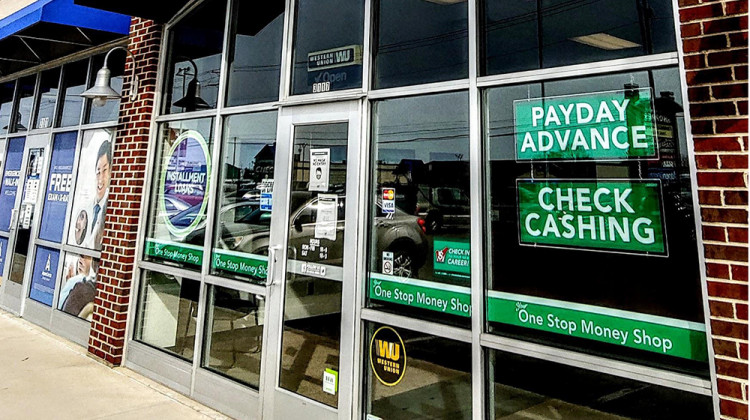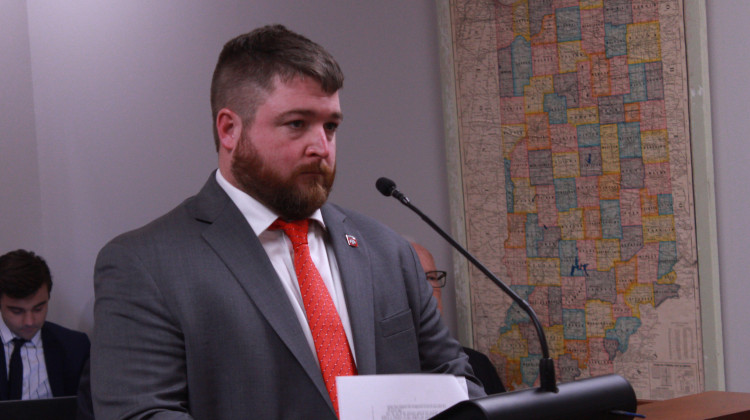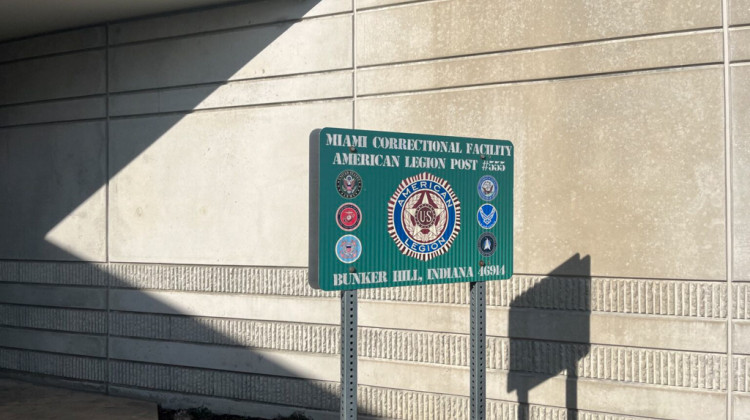
Grant County credit union Afena is targeting those who depend on payday lenders, such as those pictured, with low-interest loans.
Ed Breen/WBOI NewsElla Abbott
Two organizations are teaming up to offer small loans to Grant County residents, in an attempt to discourage reliance on high interest payday loans. The “Bridge the Gap” loan program works to create better financial literacy and help pull residents out of poverty.
Grant County has the third highest poverty rate in Indiana, at 16 percent in 2019, according to the U.S. Census. Grant County-based Afena Credit Union has developed a program to try and lower that percentage.
Experts say payday loan storefronts and the cycle of debt can add to the wealth disparity, especially for communities of color.
Marion is the Grant County seat, and is nearly 15 percent African American, according to the 2019 U.S. Census.
CEO of Afena, Karen Madrey said high interest emergency loans can lead to a cycle of borrowing and repaying.
“When you’re in a high poverty community, it makes the residents of the community a little bit more vulnerable," Madrey said. "And we know that there are lenders that prey.”
Madrey said one of her goals is to make the credit union purpose driven in providing equitable financial services to people who are financially vulnerable or marginalized.
The “Bridge the Gap” program offers members immediate access to small loans from $500 to $2500 with interest rates as low as 4.25 percent, unlike payday loans where the average interest rate is nearly 400 percent.
Dawn Brown is the CEO of the Grant County Community Foundation. Almost three years ago, the foundation embarked on a new strategic plan. One item was to begin an impact investing strategy in which foundations take a portion of their endowment fund and invest it in programs that can impact the community.
In this case, the foundation took one million dollars and invested it in the Bridge the Gap loan program.
Brown said it was at a luncheon where she and Madrey made the decision to try to partner. Afena had been approved as a Community Development Financial Institution or CDFI, which meant they could provide loans to families who may otherwise not be able to get them.
"I pitched it to my board when COVID happened, because I knew at that point these families were in even more dire straits than they had been before,” Brown said.
But payday lending has been creating a cycle of debt long before the pandemic began. Yasmin Farahi is senior policy council for the Center for Responsible Lending, or CRL. She said there are 262 payday loan storefronts in Indiana alone.
“This is a major problem in Indiana, draining over 300 million dollars from Hoosier working families over five years,” Farahi said.
CRL’s mission is to ensure a fair and inclusive marketplace for all credit-worthy borrowers. Farahi advises organizations and lawmakers that work to eliminate abusive lending practices.
Farahi said the one-time emergency loan is a myth.
“They rely on people with more than 10 loans per year, unable to to meet the terms and end up being unable to escape the cycle of debt,” Farahi said.
Sherry Dixon is the main ambassador for the Bridge the Gap program. Her job is to go out into the community and tell people about the program and encourage them to apply for a loan if they need it.
She said the position gives her the opportunity to step out into the community and help people without them feeling judged for their credit score or budget.
“I’m actually here to offer advice on how to better your credit report, advice on how to kind of start to do a monthly budget,” Dixon said.
As of March first, almost 80 loans have been given, lending more than $170,000 to members with an average credit score of 414 - including 21 participants with a credit score of zero.
Madrey said she wants the credit union to teach people how to manage their finances and help them reach their financial goals.
All of the loan officers are certified financial counselors. Each person who receives a loan will also receive personalized and free financial coaching.
“One of the reasons I’m very passionate about this is because nobody ever told me," Madrey said. "I learned from making mistakes.”
As members pay off their loans, the money goes into a separate savings account to help them build an emergency fund.
Dixon said people have been very receptive to and grateful for the program.
“I know we’re not supposed to be hugging, you know social distancing," Dixon said. "I have gotten some hugs out of new members, I’ve gotten some tears out of new members. I’ve gotten just joyous remarks.”
Speaking to anyone from Afena or the Community Foundation, it’s clear that the program is first and foremost about the people they can help.
Brown said that while there’s still a return on the Community Foundation’s investment, by members paying interest, it isn’t the only outcome they look for with the program.
"But, the biggest reason that we would be able to do that is because of the social return," Brown said.
Madrey said the program is built to help people get back on their feet once they return to work. In order to receive the loan, members are required to have a source of income, which they can show with two pay stubs.
“This is to help bridge whatever gap they have as a result of being off from COVID,” Madrey said.
Monthly payments can be as low as $35 and members are encouraged to make weekly payments of $10 to make sure they’re always paying on time. The focus is on low income families with an income of 200 percent or less of the federal poverty guidelines.
While other programs saw stalls due to COVID-19, the Bridge the Gap program was pushed forward by it.
"It was kind of pushed to the front of the line once we started seeing some of these real stories that our families were living through," Brown said. "And we wanted to see what we could do to provide them some relief, some stability and maybe just some hope.”
With a five year million dollar investment, Madrey said she hopes to see their community’s poverty rate drop.
While the Bridge the Gap loan is looking to end the cycle of lending in Grant County, Fahari said there are organizations and legislators working to end it at the state level.
“There is a way to stop this," Farahi said. "So, 17 states plus DC, stopped predatory payday lending with a rate cap of around 36 percent.”
A bill in the Indiana Statehouse has been working its way through the legislature since 2018. Farahi said getting these rate caps passed is the most effective way to end payday lending debt cycles.
 DONATE
DONATE






 Support WFYI. We can't do it without you.
Support WFYI. We can't do it without you.